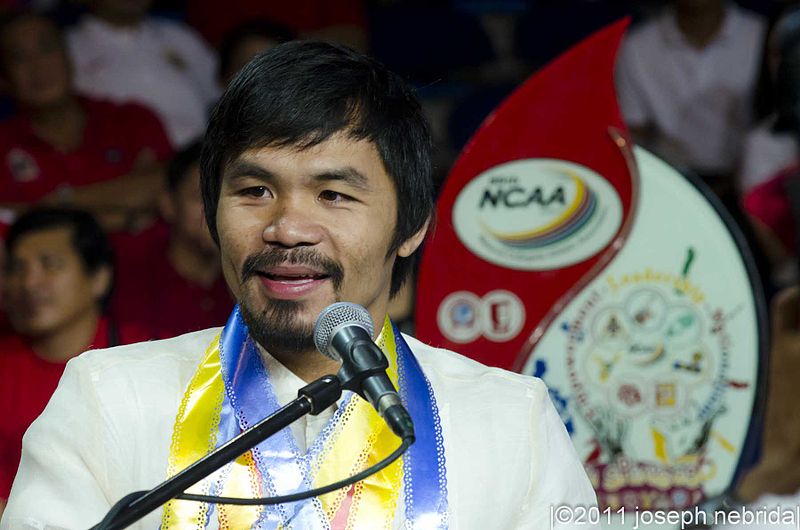
February 22, 2016, by Editor
Philippines 2016: We Need to Talk About Manny
Written by Pauline Eadie.
Political aspirants in the Philippines routinely trot out religious piety, devotion to family and humble origins as mechanisms to appeal to the masses. These humble origins often turn out to be somewhat exaggerated as in the case of Manny Villar. If a claim to humble origins is simply not credible then a love of or affinity with the poor will do. This worked well in the case of former President, and now Mayor of Manila, Joseph Estrada who capitalized on his former career as a movie star where he often played the role of defender of the poor.
However one man whose humble origins cannot be disputed is Manny Pacquiao. Pacquiao was born in Mindanao in 1978 and dropped out of school aged 12 to support his mother and siblings after his father left the family home for another woman. In due course he travelled the 500 miles to Manila as a stowaway on a boat. Once there he moved from manual labour and living on the streets to professional boxing. Pacquiao went on to winten different world titles in eight different weight divisions. Manny Pacquaio is the stuff of legends. It is reported that when he fights there is virtually no crime in the Philippines as everything stops for the match. Pacquiao’s appeal is so great that the Philippine Marines and the Moro National Liberation Front were able to put their differences aside and watch the fight against Ricky Hatton together. He is courted by politicians and celebrities, in the hope that some of his magic might rub off on them.
Pacquiao’s attempts at career diversification have not always been successful. He earns a tidy a sum endorsing various products, more of which later, but his foray into acting as the superhero ‘Wapakman’ left audiences underwhelmed, and his singing career is best skipped over. Similarly his early attempts to gain political office ended in failure. However in 2010 Pacquiao was duly elected to the Philippines Congress as the representative for Sarangani, his hometown, in southern Mindanao, a seat he held in the 2013 elections. Pacquaio has been lauded for his philanthropy in his home district however he only turned up for work in Congress four times in 2014 and passed no bills in six years. When he did turn up he, on occasion, displayed a somewhat limited grasp of proceedings. Nevertheless Pacquaio is now standing for election to the Philippine Senate in the 2016 elections.
Pacquaio is standing under the banner of the United Nationalist Alliance Party (UNA), having previously been the head of the self created People’s Champ Movement. In 2010 he ran under the banner of the Nacionalista Party. In the Philippines political parties arepersonality not program orientated and this has led in the past to politics being hi-jacked by personal interest as opposed to the needs of the masses. The exact opposite of the, ‘affinity with the poor’, rhetoric that might have got politicians into office in the first place. Traditionally ‘personal interest’ has meant corruption and such politicians have been designated trapos which translates literally to rag or dirty rag. Pacquaio is polling amongst the front runners for a Senate seat. It is unlikely that he is pursuing a political career for the money as he has a net worth of $250 million. Last week he made remarksabout same sex relationships that sent Twitter into a spin and cost him a lucrative Nike endorsement contract. Undeterred Pacquiao posted, despite a public apology, and removed biblical verses condoning death to gays. The danger would seem to be that that Pacquiao is struggling to distinguish between his personal views and the need to appeal to the diversity of the electorate. Compare this to President Noynoy Aquino who, putting aside any other failings he may be guilty of, at least had the sense to remain quiet on the issue same sex marriage when quizzed. However this viewpoint makes the assumption that Pacquiao is not playing the game of appealing to voters very well and made a mistake. On the contrary it is also possible that Pacquiao’s remarks were designed to appeal to conservative Christians. The extent to which this worked is evident in the comment section of many on-line newspapers and blogs.
The extent to which Pacquiao’s remarks will cost him votes remains to be seen. A week is a long time in politics and it is two and a half months until 9 May. Notwithstanding his remarks, his identity as a national hero and his evident philanthropy, will Pacquiao be effective as a public servant. Pacquiao is a man who has everything to lose and nothing to gain by becoming a fully operating politician after he retires from the ring. If his motivation is to help his countrymen there are ways to do this that don’t involve political office. Meaningful help for the poor in the Philippines would involve changing this deeply unequal society in favour of the poor, not just philanthropy. A tough task for any elected official.
Filipinos do not need a poster boy as a Senator, who may or may not turn up to the office, they need a visionary. Is Pacquiao up to the job? This after all is a man who is rumored, as soon as he comes of age, to have his eye of the Philippine presidency in 2022.
Pauline Eadie is an Assistant Professor in the School of Politics and International Relations at the University of Nottingham. She is Deputy Director of the Institute of Asia Pacific Studies (IAPS). This article forms part of IAPS continuing coverage of the 2016 general election in the Philippines. Image credit: Wikipedia Commons.
No comments yet, fill out a comment to be the first

Leave a Reply